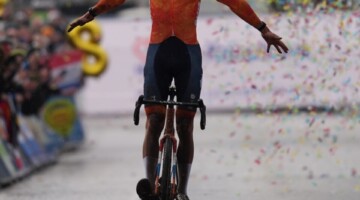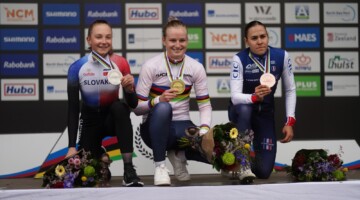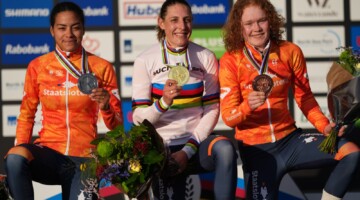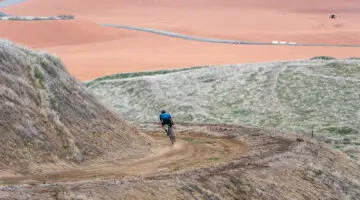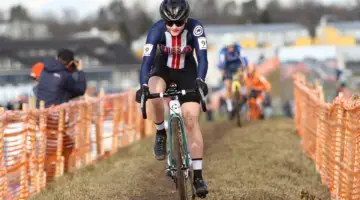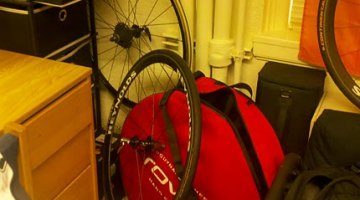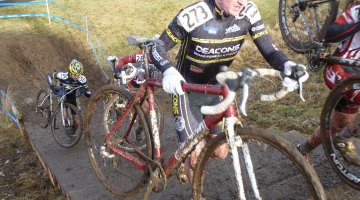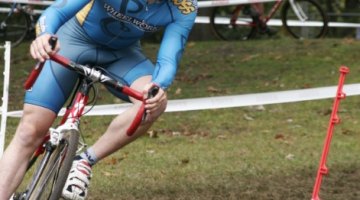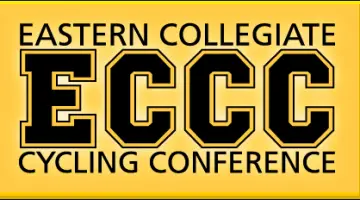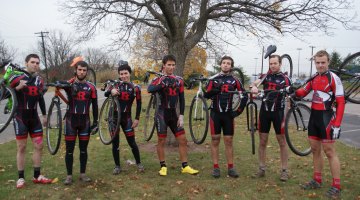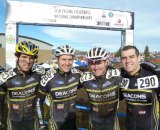
Austin Jones, Trey Wofford, James McCabe and Chris Lowe at Cyclocross Nationals. Photo Courtesy of James McCabe
by James McCabe
You typically do not think about college during the summer. Just as you do not think about cyclocross in the summer. However, if you are reading this article then chances are you are hooked. Just as I am hooked. My name is James McCabe and I am a junior student at Wake Forest University in Winston-Salem, North Carolina. I am also the president of the Cycling Club at Wake. Prior to my involved with the club my freshmen year, the club was just a bunch of road bikers with Australian accents. (Well, that was just one rider, but that is beside the point.) I have taken the Cycling Club from a bunch of disorganized roadies to one of the stronger cyclocross teams in the Atlantic Collegiate Cycling Conference (ACCC).
The road to being a successful cyclist in college is not easy. Naturally, there is always something very appealing about drinking with your buddies at a party in the wee hours of the night. This results in typically sleeping in till the early afternoon and grabbing “breakfast” with some of the hundreds of students who did the same thing as you. Clearly, this is not the lifestyle that a cyclist would lead. I can’t tell you the countless reasons as to why this isn’t ideal. I understand why this doesn’t work for collegiate cyclists, but others do not.
Telling your team that you are going on a 70 mile ride at 7:00 a.m. doesn’t really gain you a lot of respect – or team members. Lots of students on the team beg for afternoon long rides, but we all know that those are not beneficial for training. Likewise, cyclocross presents lots of major problems for the average college student – having to buy a bike, having to buy new shoes and having to tolerate those early morning rides. I have come up with a few tips as to how to get any collegiate cyclocross program off the ground and successful.
When fall rolls around in North Carolina, the temperatures are rather pleasant. Rarely do you need to bust out the arm warmers until Thanksgiving. I came to the club with an extensive cyclocross background that was born and raised in central New Jersey. I’ll be the first to say it – North Carolina cyclocross is very different from the New Jersey scene. The people, the courses, the atmosphere – all different, but all good.
That said, keeping riders interested during cyclocross season is easier than road season. For the road season, those 7 a.m. rides are in 30 degree weather with ice creeping along the shoulder. Not one really wants to do that, but you need to if you want to win. Therefore, sending out an email to the list-serv saying that we will do a few laps around Salem Lake at 4 p.m. will typically draw up a lot of interest. The problem lies in those students that do not have a cyclocross bike.
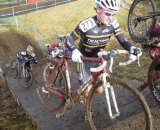
James McCabe leads Austin Jones up the stairs and out of the bowl at Cyclocross Nationals. Photo Courtesy of James McCabe
Working closely with the Club Sports Union at Wake Forest, I was able to gather enough funds to purchase two cyclocross bikes for the team to lend out to riders who need them. The money spent towards purchasing those bikes was well worth it. I was able to recruit a member of the cross country team to race cyclocross and lend a bike to one of our most successful road riders. Now cyclocross was not longer something that was impossible to do, but a rather something that if you were interested in trying, you could.
I feel that collegiate racers, as a whole, are not widely accepted in the general racing community. There appears to be some belief that collegiate racers cannot handle their bike in a road race, or that they do not understand the proper mannerisms that goes along with racers. Although this may be true for some riders on the road, this vibe is deflated come cyclocross season. Cyclocross is the easiest sport for collegiate riders to expand into. The atmosphere that I mentioned before is very accepting of new riders. In fact, collegiate racers have made a significant impact on the U23 and U25 racing community. I find that to be impressive, especially when you consider how few collegiate programs have structured training programs.
For the Wake Forest team, we have accomplished some amazing feats with cyclocross. After racing through the whole ACCC cyclocross season, we won the ACCC Division 2 cyclocross title. I won the Individual Division 2 title. That lead us to qualify for the 2010 National Championships in Bend, Oregon. Looking at our budget, I went to Student Government and made an appeal for more money. They agreed since they noticed the progress we have made in the club. Those funds allowed our four best cyclocross riders to fly across the country and race, for free.
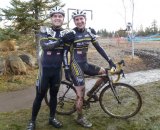
Chris Lowe and Trey Wofford hanging out after the Collegiate Men's Division 2 race. Photo Courtesy of James McCabe
Although our performance at Nationals was subpar given mechanicals and flat tires, we had an experience that none of us thought would be possible this time last summer. Those two team bikes have seen more use that I would have ever dreamed up. I feel that taking team funds to purchase cyclocross bikes go a long way towards developing a strong cyclocross program. You can race the bike all winter in the mud, sand and snow, and when the spring rolls around you can throw on the skinnies and use the bike for those kids who don’t have a road bike.
Cyclocross helped energize our team. It helped the program become national recognized, and make cycling less of a joke to the athletic program. Put it this way, the football team and basketball team had their worst seasons in school history. Everyone was down on Wake Forest sports. For myself, it was nice to put a trophy in the trophy cabinet in our gym. Although no one might ever look at it, I know that we did something that no other team at our school was able to achieve

